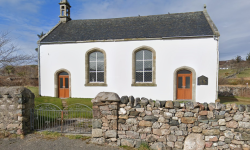Hector Morrison was a missionary in the congregation from 1911-1932.
From the Free Presbyterian Magazine Vol 41 24-27.
The late Mr. Hector Morrison, Missionary.
The Parish of Eddrachilles, in common with many another parish in Sutherland has, within recent years, been bereft of some whose removal is not merely a loss to the place in which they resided, but a loss to the world, for the words of Christ ― ” Ye are the salt of the earth ” and ” Ye are the light of the world,” were applicable to them.
Of what we consider most precious we keenly feel the loss. It is greatly to be feared that now, as much as ever, the removal of the Lord’s people to their everlasting rest does not make a very deep impression. ” The righteous perisheth, and no man layeth it to heart: and merciful men are taken away, none considering that the righteous is taken away from the evil to come.”
Eighty-four years ago last July Hector Morrison was born at Badcall, Scourie, and as far as we can learn, his youth and early manhood were spent ” having no hope and without God in the world.”
He was strong physically, and, as a young man was most daring in the face of dangers to which he was often exposed on account of his having led a sea-faring life. On three occasions he had a most miraculous escape from drowning, and, it is likely, those terrifying experiences were used of God to make him think seriously of the awfulness of passing out of time unsaved. In any case he often remarked afterwards that had death overtaken him then, he would have had the eternity of the lost.
At the time the late Rev. D. Macfarlane and others saw, that in order to be faithful to God, to His Word and to the souls of men, it was essential to separate from the then Free Church, Hector became intensely interested in the testimony which was raised because of truth. Shortly after the formation of the Free Presbyterian Church the late Rev. N. Cameron visited Scourie, and Hector was privileged to hear him preach. After the service he approached Mr. Cameron and said to him ― “If it is the truth you preached to-night then I am lost for eternity.” Mr. Cameron assured him it was the truth whatever results the declaration of it might bring forth.
He used to relate that on account of having come under a vow, when seeking baptism for his children, to hold family worship morning and evening, he was in the habit of “rehearsing” his prayer before the time for worship, and that the sweat was oozing out through his body at the thought of having to pray in presence of his wife. Another day came upon Hector when he realised that his prayers were not uttered that they might be heard merely by his fellow-sinners, but that they might be heard by Him out of whose presence, he was made sensible, he could never go.
It was at Stoer in 1898 he commemorated, for the first time, the dying love of his Lord and Saviour, and by a consistent life for nearly forty years thereafter, he manifested that his profession of the blessed name of Jesus Christ was not in name only. The divine injunction ― “And be not conformed to this world,” was not an empty dogma with Hector, and it would be in vain for any one to attempt to make him believe that it is possible to serve God and Mammon.
In 1902, together with the late Mr. William Morrison, Kinlochbervie, and Mr. Lachlan Ross, Winnipeg, Hector was ordained an elder of the joint congregation of Scourie and Kinlochbervie. Nine years thereafter he was appointed missionary of that congregation. He carried out his duties conscientiously and faithfully, until about four years ago he was obliged to resign through failing health.
As a speaker he was gifted and most acceptable to the people. His, sayings, particularly when speaking at fellowship meetings, were terse and pointed. As an example we may give the following: ” Though the natural man cannot lay hold of the truth the truth can lay hold of him.” “The witnesses are falling, but ‘The Witness’ does not, and will not fall.” At one time, a friend, who knew very well Hector’s ability give a very ready pointed answer, said to him, in the course conversation ― ” I am sure your ministers cannot dance, anyway.” “Yes, they can dance,” Hector replied, “but you can’t supply the music.”
On a certain Sabbath, while on his way to Church, a representative of another denomination met him and suggested that they could hold a joint service in the local school, and thus get all or most of the people to attend. Hector was not to be drawn into useless argument on the Lord’s Day, but, in reply to the suggestion, quoted James i. 8 ― “A double minded man is unstable in all his ways.”
At an East Coast fishing port he rebuked a man who made a public profession and whom he found in vain company indulging in foolish jesting and boisterous mirth. Addressing him, Hector said ― ” What if you were suddenly called into eternity in that state.” ” Oh,” the man said, “the Lord gives dying grace.” “Yes,” was the reply, “but to whom does he give it but to those to whom He has first given living grace.”
No man could be more diligent in anything pertaining to the cause of Christ than Hector was. For years he walked a distance of 11½ miles to and from the place of worship on the Sabbath. When he was no longer able to walk such a distance, through the kindness of Mr. and Mrs. Ross, Scourie, a car was placed at his disposal, and thus he was enabled to continue longer as Missionary. The kindness shown him in this way he highly appreciated.
It is evident he enjoyed much nearness, during his last few days in the world, to Him whom he professed to love and serve. On waking at one time, he said to a friend, who was at his bedside ― “I have had a sight of Him.” The friend replied; “Then you will be longing to be with Him,” to which he said― ‘” We must be submissive and await His own time.”
On the 29th of January he passed away, we believe, “to be for ever with the Lord.” The large concourse of people who followed his remains to the place of interment in Scourie Cemetery, testified to the high respect with which he was held by young and old alike.
To all the members of the family at home, and in a distant land, we extend our heartfelt sympathy. May they all know the blessedness of that union which death cannot sever. ” The righteous shall be in everlasting remembrance” (Ps. 112, 6). ― D. J. Matheson.

